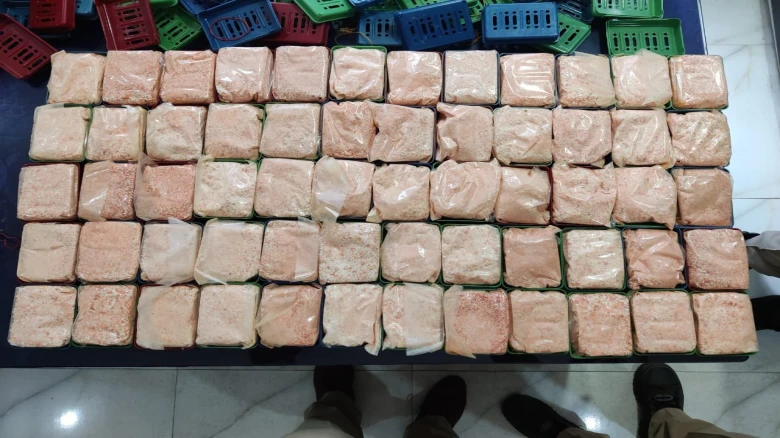The Nagaland Drug Policy draught, which was introduced in 2016 and has since been revised, is ready for approval, Tosheli Zhimomi, director of the Social Welfare department, informed while giving the keynote presentation.
Digital Desk: Nagaland Police has seized assorted psychotropic drugs worth over Rs 117 crore from June 2021 till June 2022 from different parts across the State.
During the International Day against Drug Abuse and Illicit Trafficking programme held at the capital convention centre in Kohima, SP (Narcotics) P. Bendangchuba Jamir made this statement while presenting the "supply reduction scenario of Nagaland."
Jamir told the audience that despite significant seizures by law enforcement, customer demand remained high since the product was easily accessible because of the open international border, particularly in the difficult-to-track Noklak and Mon areas and along the Assam-Nagaland border. Therefore, he stressed the importance of creating solid mechanisms between law enforcement agencies, stakeholders, and the general public to curb smuggling.
Commissioner and secretary of Social Welfare, Martha R. Ritse speaking as a special guest under the theme "Addressing drug difficulties in health and humanitarian crisis" admitted that drug misuse had become a big social issue and was a major barrier to development at all levels.
She claimed that due to the rapidly changing environment, synthetic and intravenous substances have caused an increase in HIV/AIDS cases, raising serious safety concerns. She noted how Nagaland's location has made the state vulnerable to the trafficking of various illegal narcotics across porous national and international boundaries, leading to the loss of lives from substance usage.
In addition to encouraging more churches and civic society to step up and collaborate in addressing drug-related concerns, NGOs like Ritse, Kripa Foundation, and Nagaland Users Network in the field acknowledged the importance of the Narcotics Cell (PHQ).
She also mentioned that the department was working with the Ministry to establish additional rehabilitation and de-addiction facilities in order to increase the state's use of need-based intervention tactics.
She said that the department has covered Kohima, Dimapur, and Mon as part of the "Nasha Mukt Bharat Abhiyan" initiative.
She argued that primary prevention is essential for keeping kids and teenagers out of such hazardous habits, and she urged everyone to reconfirm their commitment to making the world a drug-free place.
The Nagaland Drug Policy draught, which was introduced in 2016 and has since been revised, is ready for approval, Tosheli Zhimomi, director of the Social Welfare department, informed while giving the keynote presentation.
Tosheli stressed the importance of community involvement in raising awareness about substance misuse, particularly among vulnerable groups, in order to aid in the fight against it.
While the Nagaland Liquor Prohibition (NLTP) Act was in effect and the State had spoken about the need for a collaborative reaction, Dr. Joyce Angami of the Kripa Foundation noted that the Act had failed to achieve its goal and that many lives had been lost as a result of premature death. Talking about the huge demand for alcohol in the state, she alleged that even small pan shops in every street corner were selling alcohol.
Joyce said that there had been no limits on the flow of drugs and alcohol into the state, despite various COVID-related prohibitions. She was worried that the state would go through what the 1990s experienced when drug misuse and HIV/AIDS made the news.
She urged the Social Welfare Department, the church, and other interested parties to join together and organise regular meetings to develop solutions for reducing drug and alcohol misuse in the state.
Notably, the program was chaired by Meneseno Ao; invocation prayer by pastor, Phezoucha Baptist Church, Keduoneituo Yhome; special number by CBC Choir and a vote of thanks was pronounced by DPO Kohima, Imkongzenla.
Dr. Ruokouvilie Sachu, the pastor of Khedi Baptist Church, gave the blessing, and Kohima Ao Baptist Church and Central Baptist Church, Kohima, shared their personal experiences.
The Narcotic Cell (PHQ), Kripa Foundation, Kohima Ao Baptist Church, Central Baptist Church Kohima, and Nagaland Users Network collaborated to organise the programme.
Here is the list of seized drugs:


Leave A Comment